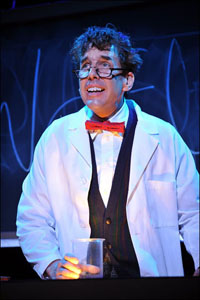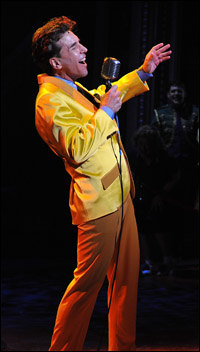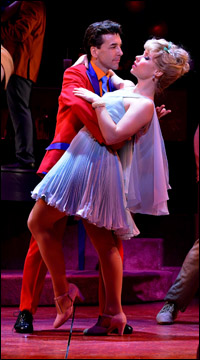
*
Editor's Note: This interview was conducted several days before the unexpected Aug. 6 death of composer Marvin Hamlisch.
Dramatist Rupert Holmes has a Broadway revival of his musical The Mystery of Edwin Drood on his plate for the fall. The show earned Tony Awards as Best Musical and Best Book and Score, launching him into a successful stage career following international success as a writer-singer of pop music ("The Pina Colada Song," anyone?). This summer, Holmes has been calculating and adjusting the formula for the success of his latest musical, The Nutty Professor, for which he wrote book and lyrics, to the music of Tony winner Marvin Hamlisch. Jerry Lewis, who starred, directed and co-wrote the 1963 film comedy of the same name, directs the musical reinvention in its current out-of-town tryout in Nashville.
We reached out to Holmes — whose works for the stage also include Say Goodnight, Gracie; Curtains; Accomplice; Robin and the 7 Hoods; and A Time to Kill — during the preview period of The Nutty Professor. Performances continue to Aug. 19 at the James K. Polk Theater in the Tennessee Performing Arts Center. (For more information, visit nuttyprofessormusical.com.)
One of the things people associate with the source material of your new show is the "nutty" quality of the story — the outrageous and the absurd. A geeky professor's potion turns him into a handsome, crooning lover. Does this make The Nutty Professor – The Musical a purely comic musical full of whimsy, or is there a sincere heart — a reality — at the middle of it, as well? That is, how much has "finding the sincere heart" been part of the writing process, or is it all delicious daffiness?
Rupert Holmes: Marvin and I have tried to write a Nutty Professor for the stage which, beneath all its colorful cartoonery, possesses a genuine and vulnerable heart. I always try to keep in mind that while the characters in a farce may find themselves in outrageous dilemmas, and may behave in a way that the audience finds amusing, the characters themselves don't have the consolation of knowing they're in a comedy. When Professor Kelp's heart is broken, or when he discovers he's an object of ridicule, his pain is very real to himself even while his response may be sadly comical to the audience.
| |
 |
|
| Michael Andrew in The Nutty Professor. | ||
| photo by Rick Malkin |
Our story is as much about finding a sense of self, and accepting who we are despite all our inherent flaws, as it is about exploding laboratories and Alaskan Polar Bear Heaters.
What period are we in?
RH: We are resolutely in the pre-Beatles '60s, when the movie itself was set, and this time frame serves our purpose wonderfully. I know first-hand that this was a time when conformity was an attribute, good looks were narrowly defined for both men and women, people with brains were eggheads, and a prescription for eyeglasses was a social death sentence.
What flavors does the score flirt with?
RH: It's Hamlisch at his best, with a number of deeply touching and timeless ballads, but also with several charm songs and production numbers compatible with classic American musical comedy. There is also the occasional nod to dance music of the period, including the Hully-Gully, the Swim, and that ultimate expression of world-weary sophistication, the extremely Slow Twist.
| |
 |
|
| Michael Andrew as Buddy Love. | ||
| Photo by Rick Malkin |
RH: The Nutty Professor brought the two of us together as a songwriting team, but it's worked out so harmoniously that we've written a number of other major songs while completing the Nutty score, including a production number for a once-in-a-lifetime cast that included Chita Rivera (who's starring in this fall's revival of The Mystery of Edwin Drood), my buddy from Curtains Karen Ziemba, Angela Lansbury, Charlotte d'Amboise, Ann Reinking, Randy Skinner and Marge Champion. [The number was for the Career Transition for Dancers' 25th Anniversary Silver Jubilee: A Star-Studded Retrospective, which was held Nov. 8, 2011, at New York City Center.]
As for our process, Marvin and I have had parallel musical careers. Both of us were classical musicians, him Juilliard, me Manhattan School of Music, we both have written, arranged and conducted albums for Barbra Streisand, we've both written songs for her movies, we've both had Top Ten hits and we both frequently guested on Merv Griffin. That last credit is pretty impressive, don't you think? Marvin is a composer who could have been a lyricist if he'd put a mind to it, and I'm a lyricist who is a composer when I put my mind to it. We communicate in the most minimalist verbal shorthand. A typical exchange will be "But that should be"…"I know but then you'd have to"…"Of course, but it's already in the"…"Fine I'll have it by"…"No, I need it sooner."
Was Jerry Lewis precious about his source material? Was there a "must-use" edict for certain scenes of the film (or maybe that material was self-evident)?
RH: Jerry was and has been remarkably gracious, giving us free rein while lending support to all the new scenes and spins on Kelp, Buddy Love and Stella that we've created from his original characters. There were moments whose inclusion seemed mandatory, especially since I thought the audience would physically assault me if they weren't present. But even in those few instances, we've reinvented and reconceived them so they serve as musical theatre and not merely souvenirs of the film.
What was your relationship with the film before you became involved with the musical?
RH: I loved the movie as both a kid and adult, greatly admired the pathos amid the slapstick, identified with its hero, and was very aware even as a boy of what an audacious vision Jerry Lewis had created. He did something that Elvis Presley and the Colonel never did. He defied Paramount Pictures and made a movie that went completely against the phenomenally profitable formula that had worked so well for the film studio. He abandoned the "Jerry" character that the world knew and loved, and gave them two very different leading men, one of whom was the absolutely un-loveable Buddy Love. And in doing so, he created a story that is incredibly relevant today, as people adopt false identities on the Internet and allow their avatars to speak in a cruel and thoughtless way.
| |
 |
|
| Michael Andrew and Marissa McGowan | ||
| photo by Rick Malkin |
RH: From my earliest days, along with every other boy my age, I absolutely worshipped Martin and Lewis. Before the Beatles, they were the coolest guys on the planet. To witness Dean and Jerry in color in a movie theatre after staring at them in monochrome on TV on the Colgate Comedy Hour approached a religious experience. And when they split up, it was the first major trauma most of us kids had to contend with. Then Jerry started making these remarkable gems of visual comedy, such as "The Bellboy," "The Ladies Man" and "The Errand Boy," and I realized that the world hadn't ended, it had just moved to a different plane. Jerry was the American king of comedy long before he turned in his stunning performance in Scorsese's film of the same name. Not since Chaplin, Keaton and Lloyd in the silent era had one person been so revered as both a cinematic clown and auteur." How did you become attached to the show?
RH: Well, the reflex answer is that I became emotionally attached to the show from the moment Marvin and I began to write it. But the truth is that the producers had seen my work on Curtains, the Kander and Ebb musical I set in 1959 with the splendid David Hyde Pierce as an endearing, mild-mannered hero, all of which were within striking distance of the period and the hero's personality of The Nutty Professor. They were also aware that my first mystery novel "Where the Truth Lies" was a kind of fictional paean to the success of Martin and Lewis. Plus when I sang the first songs that Marvin and I wrote for Jerry's review, I did a pretty good impression of what Professor Julius Kelp would sound like if he were singing. List that under Special Skills.
(Kenneth Jones is managing editor of Playbill.com. Follow him on Twitter @PlaybillKenneth.)










